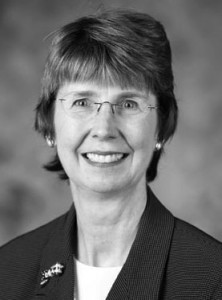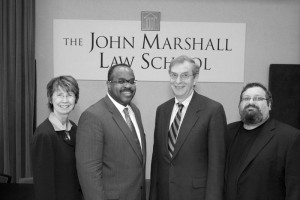
Professor Kathryn J. KennedyAssociate Dean for Advanced Studies and Research and Director of the Center for Tax Law and Employee Benefits
We had a terrific 2009–2010 academic year, filled with new curriculum and new programs. My personal thanks to my staff—Barry Kozak, associate director of the Graduate Employee Benefits Programs and the Center’s program coordinators, Steve Szydelko and Kathy Winiczay, who strive every day to create an environment for students that allows them to be successful and productive. I’d like to personally thank Cam Moultrie, student editor of this edition of InBrief, for all her efforts in making this publication a reality. In her editorial, Cam stresses the importance of mentorship, not only in the context of employee benefits law, but in life generally. At the Center, we strive to make mentorship opportunities available to students, through our participation with the Illinois State Bar Association Employee Benefits Committee’s Mentorship Program and the ABA Section on Taxation’s Mentorship Program, as well as other bar functions.
Enrollment and Curriculum
Over the past academic year, the Center welcomed 32 new students, for a total of 77 students. Of the 32 new students, 21 are enrolled in the Graduate Tax Law Programs and 11 are enrolled in the Graduate Employee Benefits Programs. We continue to see an increase in the number of joint degree candidates, as we aggressively market to John Marshall’s JD students. The marketing efforts are paying off as we are recruiting more MS candidates, as well. This past spring, we offered 21 courses, as well as a graduate seminar, for a total of 653 semester credit hours for the fall, spring, and summer semesters.
Our externships and practicums continue to be popular with our LLM students, affording them legal experiences in government and law firm settings. Our newest externship—with the IRS’s Employee Plans Office of Rulings and Agreements within the Tax Exempt and Government Entities Division (TE/GE)—resulted in two permanent job offers for recent graduates. One of our Tax Law Advisory Board members who wishes to remain anonymous has graciously extended a $5,000 scholarship for another year. The scholarship was awarded to Audrey Kucia, an extern at the IRS’s Office of Rulings and Agreement in its Cincinnati office, who will be involved with the IRS’s determination letter program. The William F. Sweetnam Jr. Scholarship provided $5,000 for the student selected to extern with the U.S. Department of Treasury’s Office of Tax Policy. This year’s recipient, Cam Moultrie, is also responsible for the student editor’s portion of this publication.
Alumni Events
As is our custom, each spring we invite our alumni to participate in a career panel, in conjunction with the Careers Services Office. These panels are always popular as they not only inform students about how our alumni found job opportunities, but illuminate the diverse range of opportunities that exist. Students learned from the Employee Benefits Alumni Career Advice Panel that more than 20 John Marshall alumni populate the U.S. Department of Treasury’s Employee Benefits Security Administration.
Center Program Events
As you’ll read in this publication, during the spring the Center’s Tax Law Lunch & Learn Series provided a wealth of material on timely tax issues, ranging from internet taxation to taxation of hedge fund managers. These events are designed to attract current JD students into tax law by highlighting cutting-edge tax issues. The Center’s Distinguished Lecture Series in Employee Benefits Law invited well-known ERISA scholars to the law school to share their scholarship with our faculty, students, and the legal community. This past spring, we had the pleasure to host Professors Lawrence Frolik, David Hyman, and Peter Martin on a wide range of ERISA issues, mainly on health care reform and Social Security. After completing their papers, some of these professors presented their finished scholarships on health care reform at the Eighth Annual Employee Benefits Symposium, hosted at the law school on April 29, 2010. Our distinguished moderator, Alvin Lurie, led discussions about health care reform less than a month after the passage of the federal legislation. The scholarship presented at the symposium by Professors Hyman, Frolik, Davis, Kozak, and Monahan will be published in the 2010 edition of the NYU Review of Employee Benefits and Executive Compensation.
The Center hosted the Third Annual Institute on the Ethics of Tax Law Practice for the spring 2010 semester, providing four hours of CLE ethics credits for attorneys. At that event, we announced the winner and two honorable mentions for the 2010 Paul Faherty Tax Law Writing Competition.

From left, Professor Kathryn Kennedy, LLM in Employee Benefits candidate Kelvin Jones, Professor Lawrence Frolik, and Barry Kozak, associate director of the Graduate Employee Benefits Programs.
IRS Opportunities
The past academic year was busy for me due to my involvement with the IRS’s Advisory Committee on Tax Exempt and Governmental Entities (ACT). On June 9, 2010, the Employee Plans (EP) subcommittee of ACT had the honor of making recommendations to Douglas Shulman, the IRS commissioner, regarding changes to the IRS’s newly revised determination letter programs. During that June meeting, the EP subcommittee selected another topic for review for the next fiscal year’s report. These periodic visits to the IRS in Washington, DC, have also given me the opportunity to link up with our alums—who are presently employed at the IRS; Washington, DC, law firms; the U.S. Senate Finance Committee; and the Office of Senator Robert P. Casey Jr. (D-PA).
Barry Kozak and I continue to remain active on the IRS’s Great Lakes TE/GE Advisory Council, which consists of 45 practitioners who interact with the Great Lakes Area TE/GE Division, providing a forum to share concerns regarding both policies and specific employee benefit issues and procedures. This past February we had the privilege of participating in a joint meeting with the councils from the Great Lakes, Gulf Coast, and Mid- Atlantic at the University of Baltimore School of Law. John Marshall hosted the following quarterly meeting in July and will host the upcoming meeting in October. This summer, we hosted and videotaped the IRS Annual Hot Topics, which featured 10 practitioners from private practice and the IRS. The video will be used by the IRS for internal training of its employee benefits agents.
Recent Publications and Speeches
I am still awaiting the publication of the second edition of my textbook, co-authored with Paul Shultz III, expected shortly. As a result of an invitation to participate in the Third Annual Symposium of the University of Houston’s Business and Tax Law Houston Journal, the journal published my article entitled “Excessive Executive Compensation: Prior Federal Legislative and Regulatory Attempts to Curb Perceived Abuses,” in the spring 2010 edition. As I was invited to write for the 2010 edition of the NYU Review of Employee Benefits and Executive Compensation, I chose an article dealing with the judicial standard of review in ERISA benefits cases in light of the 2008 Supreme Court decision in Glenn. Due to the Supreme Court’s April 21, 2010, opinion in Conkright, the article had to be updated overnight to include recent developments.
I also had the pleasure of speaking at the May 2010 ALI-ABA ERISA Basics Seminar on the basic qualification requirements applicable to pension and profit sharing plans with Employee Benefits Advisory Board Member Priscilla Ryan, a partner at Sidley Austin LLP; the June 2010 ASPPA/IRS Great Lakes Benefits Conference on the topic of EPCRS Update/Case Studies with Avaneesh Bhagat, program coordinator of EP Voluntary Compliance, TE/GE Division of the IRS; and the June 2010 ACOPA Conference updating actuaries on recent ERISA court cases. Due to the last minute cancellation of the keynote speaker at the June 2010 ASPPA/IRS Great Lakes Benefits Conference, I volunteered to present the ACT’s EP subcommittee 2010 recommendations regarding the IRS’s determination letter program, which the subcommittee presented just a week before.
eClass Distance Education
Under the direction of Professor Robert Nye and Library Director and Professor June Liebert, we made the foundational courses in the employee benefits degree program available online in January 2010. The three survey courses—Survey of Executive Compensation Plans, Survey of Retirement Plan Issues, and Survey of Welfare Plan Issues—as well Fundamentals I of Retirement Plan Issues, went online for the spring 2010 semester. Three other employee benefits courses—Fundamentals II of Retirement Plan Issues, Tax and Employee Benefits Research, and Introduction to Legal Analysis & Substantive Law Overview—were developed for online delivery this fall semester. Our goal is to attract out-of-town candidates to these online courses in order to complete the first 14 hours of graduate study, and then incent them to come to the law school to finish the remaining 10 hours of study in order to attain the degree. Thanks to the assistance of Jessica Whittman, John Marshall’s librarian dedicated to distance education, the courses were successfully launched and implemented.
In Closing
We had busy and exciting spring and summer semesters. My heartfelt thanks to student editor Cam Moultrie and to Barry Kozak for editing this biannual review. Participating in this publication allows our students to give back to the Center by sharing their educational articles and informative reviews and profiles. Thank you all for your input! Under the continued leadership and vision of Dean John Corkery, I look forward to planning productive and rewarding curriculum and programs in the coming academic year.
